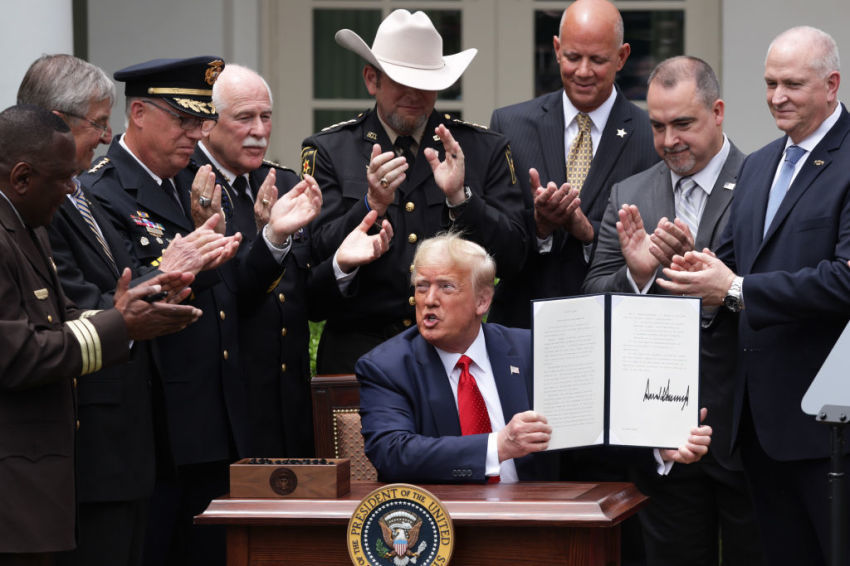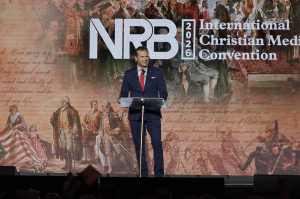Trump signs executive order incentivizing chokehold bans, policing reforms

President Donald Trump signed an executive order Tuesday encouraging police departments nationwide to enact policies that prohibit the use of chokeholds that restrict airflow except in situations where the use of deadly force is permitted.
Weeks after the Memorial Day death of African American George Floyd, who died after now-fired officer Derek Chauvin pressed his knee down on Floyd's neck for 8 minutes and 46 seconds as other officers restrained his back and legs, Trump announced a new wide-ranging executive order in a ceremony held in the White House Rose Garden.
In his remarks, Trump stressed that the new executive order encourages police departments across the nation to "adopt the highest professional standards to serve their communities."
"These standards will be as high and as strong as there is on Earth," Trump said, as he praised the "vast majority" of America's police officers as "selfless and courageous public servants."
In response to calls from the left to defund police departments, Trump said he's opposed to such demands, noting that it would be "dangerous" for communities as its police officers who run into the line of danger when others' run away.
"Unfortunately, there have been instances in which some officers have misused their authority, challenging the trust of the American people, with tragic consequences for individual victims, their communities, and our Nation," the executive order states. "All Americans are entitled to live with the confidence that the law enforcement officers and agencies in their communities will live up to our Nation's founding ideals and will protect the rights of all persons."
"Particularly in African American communities, we must redouble our efforts as a nation to swiftly address instances of misconduct," the order adds.
The new order calls on state and local law enforcement agencies to "constantly assess and improve their practices and policies to ensure transparent, safe, and accountable delivery of law enforcement services to their communities."
"Independent credentialing bodies can accelerate these assessments, enhance citizen confidence in law enforcement practices, and allow for the identification and correction of internal deficiencies before those deficiencies result in injury to the public or to law enforcement officers," the order explains.
Trump's order also calls for Justice Department grant funding to be given "only to those state and local law enforcement agencies that have sought or are in the process of seeking appropriate credentials from a reputable independent credentialing body certified by the Attorney General."
"Reputable, independent credentialing bodies, eligible for certification by the Attorney General, should address certain topics in their reviews, such as policies and training regarding use-of-force and de-escalation techniques; performance management tools, such as early warning systems that help to identify officers who may require intervention; and best practices regarding community engagement," the order reads.
The order calls for the attorney general's standards for certification to require credentialing bodies to at least confirm that "the State or local law enforcement agency's use-of-force policies prohibit the use of chokeholds" and "adhere to all applicable Federal, State, and local laws."
Chokeholds are defined by the order as "a physical maneuver that restricts an individual's ability to breathe for the purposes of incapacitation." The order states that chokeholds can be permitted "in those situations where the use of deadly force is allowed by law."
The use of chokeholds to detain suspects in situations where the use of deadly force is not needed has come under scrutiny in recent years following the death of Eric Garner in New York City Police custody in 2014. However, a grand jury did not hold the officer involved in Garner's killing criminally responsible.
On Memorial Day, national outrage was reignited when the video of the 46-year-old Floyd went viral.
The video showed Floyd begging officers to breathe as the knee of officer Derek Chauvin pushed his neck down to pavement for several minutes before his body went lifeless.
All four officers involved in the incident have been arrested and charged, with Chauvin being charged with second-degree murder.
Trump's order also calls for the Department of Justice to create a database to coordinate the sharing of information between federal, state, local and tribal law enforcement agencies "concerning instances of excessive use of force related to law enforcement matters."
Trump said in the Rose Garden that a "problem" has been that officers with "significant issues" have been able to move from "one police department to the next."
According to the order, the database should have the capability to track terminations and de-certifications of law enforcement officers as well as judgments against law enforcement officers accused of improper use of force.
"The database described in subsection (a) of this section shall account for instances where a law enforcement officer resigns or retires while under active investigation related to the use of force," the order states.
Additionally, the executive order calls for the promotion of using social services as the "primary response" to individuals who "suffer from impaired mental health, homelessness, and addiction." The order calls for officers to be trained in how to deal with people who are homeless, addicts and people with mental health issues.
The order calls for policies that "increase the capacity of social workers working directly with law enforcement agencies."
"Since the mid-twentieth century, America has witnessed a reduction in targeted mental health treatment," the order states. "Ineffective policies have left more individuals with mental health needs on our Nation's streets, which has expanded the responsibilities of law enforcement officers."
The order advises the Justice Department to work with the Department of Health and Human Services to "provide guidance regarding the development and implementation of co-responder programs." Such programs, according to the order, would involve "social workers or other mental health professionals working alongside law enforcement officers so that they arrive and address situations together."
Finally, the order calls for the Justice Department to work with the White House to propose legislation to Congress that will "enhance the tools and resources available to improve law enforcement practices and build community engagement."
The Rev. Samuel Rodriguez, president of the National Hispanic Christian Leadership Conference and a California megachurch pastors, called Trump's order an act that begins the "process of rebuilding trust between communities of color and law enforcement."
"The vast majority of African Americans and Latinos not only are in favor of good policing — they demand it!" Rodriguez said in a statement. "For that matter, I am grateful that the president is beginning to exercise his executive authority for the purpose of advancing a narrative that addresses excessive force with training and additional elements that will mitigate our current malaise."
"Defunding the police is illogical, unreasonable and dangerous," Rodriguez added. "On the other side, reforming the police provides an antidote to the current angst, and will begin a process of building trust between communities of color and law enforcement."
In an interview with Fox News, Vice President Mike Pence said the reforms found in the order reflect some of the concerns the administration has heard from "law enforcement and from leaders in the African American communities."
Last week, Trump heldroundtables with African American and law enforcement leaders to discuss issues of race and police reform.
Despite the order, prominent left-leaning figures are still not happy.
"Trump's executive order is toothless and meaningless," tweeted Al Sharpton. "We don't need studies, we need police that commit crimes to be punished. All police that use chokeholds claim their lives were threatened, what's new?"
Speaker of the House Nancy Pelosi wrote in a tweet that Trump's order "falls seriously short of what is required to combat the epidemic of racial injustice & police brutality that is murdering black Americans."
Tim Mak, NPR's Washington investigative correspondent, argued in a Twitter thread that while Trump's order calls for the prohibition for chokeholds that restrict breathing, it doesn't expressly ban chokeholds that restrict blood flow to the brain.
"Reducing use of chokeholds that restrict airway does NOT also restrict the use of holds that restrict 'blood flow to the brain,'" he wrote. "You might recall that the lawyer for the police officer who put Eric Garner in a neck restraint insisted it was not a 'chokehold.'"
South Carolina Attorney General Alan Wilson, a Republican, said in a statement that the order "brings needed improvements that will mean safer communities."
Meanwhile, Utah Attorney General Sean Reyes, a Republican, said in a statement that the "federal resources for peace officers and co-responders are a powerful step forward for law enforcement."
Follow Samuel Smith on Twitter: @IamSamSmith, or Facebook: SamuelSmithCP.



























